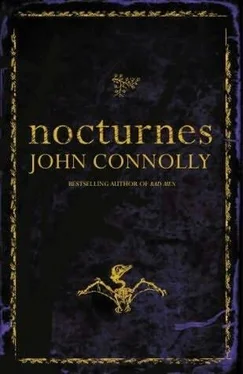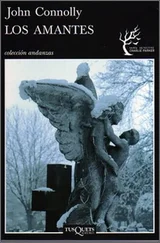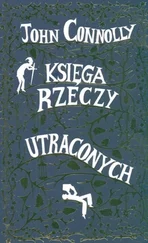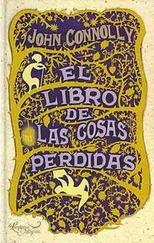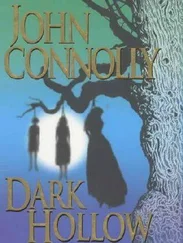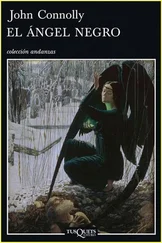I parked beside the gray municipal building and headed inside. The local cops shared the premises with the town council, a fire truck, a garbage truck, and what looked like a charity store, its windows grimly festooned with old men’s suits and old women’s bingo dresses. At the little office inside the door I gave my name to the elderly secretary, who looked old enough to remember William Bingham in pantaloons. Then I gave it to her again, as she’d managed to forget it somewhere between hearing it and looking for a pen with which to write it down. Behind her, an overweight woman with frizzy black hair typed slowly on a computer, the expression on her face suggesting that someone had forced her, on pain of death, to suck repeatedly on a sour lemon. They seemed like the kind of women who considered it their sacred duty to be unhappy and regarded anyone with a smile on his face as mired in unimaginable vice. I smiled, and tried to give the impression that I only engaged in imaginable vices. In return, the secretary directed me to an uncomfortable plastic chair. When I sat on it, it teetered to the left, forcing me to shift my weight to the right or tumble straight back out the door.
After a couple of minutes, a man appeared in the doorway of the room to my left. He wore a brown uniform shirt and neatly pressed brown trousers. According to the badge at his breast, his name was Grass. The local stoners probably laughed themselves blue in the face, at least until Grass got up close and personal with them. He was a big man in his fifties, and he still looked fit. There was no paunch, and when he shook my hand I felt one of my knuckles pop. His face was deeply tanned, making his gray mustache and hair seem all the more startling. He should have lost the mustache, I thought: without it, and wearing a hat, he could have passed for early forties.
“I’m Wayne Grass,” he said. “Chief of police.”
“Charlie Parker,” I said. “I’m a private investigator.”
“I know who you are,” he said. “Pleased to make your acquaintance.”
I followed Grass into his office. It was tidy, with flowers growing in pots on the windowsill. There was a picture of a woman and two children on his desk. The woman was very pretty and looked a lot younger than Grass. The kids, a boy and a girl, were in their early teens.
“My family,” he said, spotting the direction of my glance.
“Recent picture?”
“Just last year. Why?”
“No reason,” I said.
“My wife is a little younger than I am, if that’s what you mean.”
“Nice work,” I said.
Grass grinned and reddened. He offered me coffee. I declined, and he settled back into his chair.
“So what can I do for you, Mr. Parker?”
“I’ve been hired by a man named Frank Matheson. He’s worried about a photograph that he found in the mailbox of a house that he owns. It’s the photograph of a child. The house is the old Grady house.”
I waited, watching the smile on Grass’s face melt away.
“I’m disappointed,” he said at last.
“Why would you be disappointed?”
“I told Frank Matheson that I’d take care of it, and I will, but I’m not going to let him scare some little girl and her parents half to death, and maybe start a panic among others, just because he found a picture in a mailbox.”
“You think that’s what he wants to do?”
“I don’t know what he wants, but that will be the result. We need to tread softly on this thing. We’ll circulate the picture, see what comes up. Hell, it may not even have been taken in the state. That photograph could have come from anywhere. But if Frank Matheson or anyone else goes to the newspapers and the TV stations and starts telling them that this little girl’s picture was placed in a dead child killer’s mailbox, what do you think is going to happen?”
“Maybe you’ll find the girl.”
“Or maybe we’ll be accused of starting a panic over nothing, of overreacting to what’s probably just a sick practical joke. Next thing, I’ve got the media down here showing images of the Grady house, and then the freaks will start to arrive. Maybe the whole shitstorm will give one of them an idea, and then we really will be looking for an endangered child. Like I said, we’re going to work at getting the photograph out to local and state law enforcement, then school boards. We find that little girl, then we can just take her parents quietly to one side and tell them what we know, which is squat.”
In one way, I knew Grass was right. The whole affair had to be handled delicately, and there was no point in frightening a little girl and her family over what might be nothing. But I realized that Grass was approaching the issue from one perspective, and Matheson was approaching it from another: Grass believed that the child probably wasn’t in any danger, because there was no evidence to suggest otherwise, but, heightened (or, perhaps, tormented) by his own loss, Matheson’s instincts told him that the child was at risk. I was stuck in the middle, wanting to believe Grass, but half persuaded by Matheson’s concerns.
“Were there any prints on the envelope?”
“None, apart from Matheson’s, and we don’t suspect him of putting an envelope in his own mailbox and then bringing it to us.”
I agreed that it didn’t sound likely, mainly in an effort to diffuse what felt like growing tension between us. Small-town cops don’t like people questioning their decisions. Even big-city cops don’t like it very much, but they tend to be less protective of their patch.
“Have you been out to the Grady house recently?” I asked Grass.
“We check it pretty regularly. The place is locked down tight. I was back there after Frank Matheson found the photograph. There was nothing out of the ordinary.”
“When you say ‘we’…?”
“We have four officers in total, myself included: three male, one female. They’re good people.”
“So sometimes one of them will go by there and open up the house?”
“Well, occasionally. Mostly, I do it myself. Easier that way. I don’t have to worry about the keys getting lost, or someone getting spooked.”
“Spooked?”
“You know what happened in that house. It’s not a place to visit unless you have to. It’s got a bad feel about it, and always will have. It stinks too. Something in the paints and pastes that Grady used. It just seems to get worse and worse. After twenty years, I’m used to it. It doesn’t get to me so much. Someone else, someone new…”
He trailed off.
We sat like that, in silence, until I stood and thanked him for his time.
“Like I said, it was my pleasure, but I don’t know what more you can do for Mr. Matheson.”
“I’m not sure either,” I said. “I think I’ll just nose around. If I find out anything, I’ll let you know. I’d appreciate it if you could see your way clear to doing the same.”
I gave him a card. He placed it carefully in his wallet, then gave me a card of his own in return from a little dispenser on his desk.
“You going to take a look at the Grady house while you’re up here?” he asked.
“I think I will, since I’ve come all this way.”
“You want me to go out there with you?”
“I believe I’ll be okay.”
He nodded to himself, like a man who feels secure in the conclusion that he has just reached.
“I guess this is the point in the conversation where you tell me that you don’t scare easy,” he said.
“Being scared isn’t the problem,” I replied. “It’s not running away that’s the hard part.”

The Grady house was much as I remembered it from the news reports of the time: a little more overgrown with ivy, perhaps, its windows now boarded up and a pair of padlocked steel doors preventing access through either the front or back of the house, but these were relatively cosmetic changes. The Grady house was ugly when it was built, even foreboding in its way, although I felt certain that this impression was mostly a consequence of my knowledge of its past. I circled the house, checking the windows and the doors to see if they had been tampered with in any way, then returned to the mailbox and gave it a cursory check. It was empty, apart from some dead insects and a faded flyer offering free soda and fries with every pizza delivery.
Читать дальше
